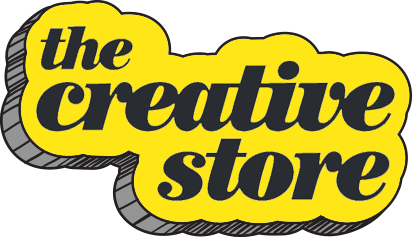The 15 Best JavaScript Charting Libraries
It is practically impossible to imagine any dashboard without graphs and charts. They present complex statistics quickly and effectively. Additionally, a good graph also enhances the overall design of your website.
In this article, I will show you some of the best JavaScript libraries for graphs / charts. These libraries will help you create beautiful and customisable charts for your future projects.
While most of the libraries are free and open source, some of them provide a paid version with additional features.
D3.js — Data-Driven Documents
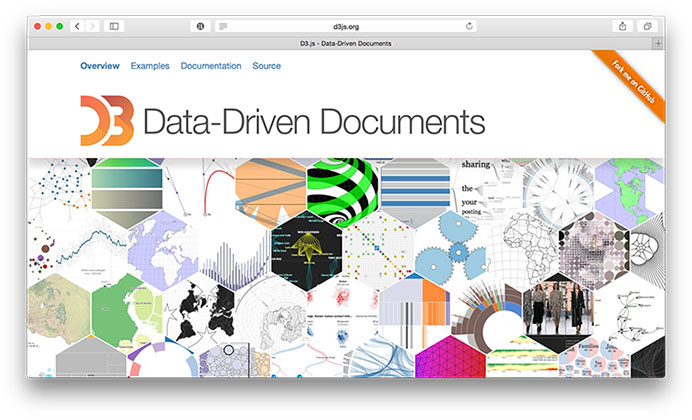
When we think of charting today, D3.js is the first name that comes up. Being an open source project, D3.js definitely brings many powerful features that were missing in most of the existing libraries. Features like “Enter and Exit”, powerful transitions and syntax familiarity with jQuery or Prototype make it one the best JavaScript libraries for charting. Charts in D3.js are rendered via HTML, SVG and CSS.
Unlike many other JavaScript libraries, D3.js doesn’t ship with any pre-built charts out of the box. However, you can look at the list of graphs built with D3.js to get an overview.
D3.js doesn’t work well with older browsers like IE8. You can always use plugins like aight plugin for cross browser compatibility.
Websites like NYTimes, Uber and Weather.com have used D3.js extensively in the past.
Google Charts
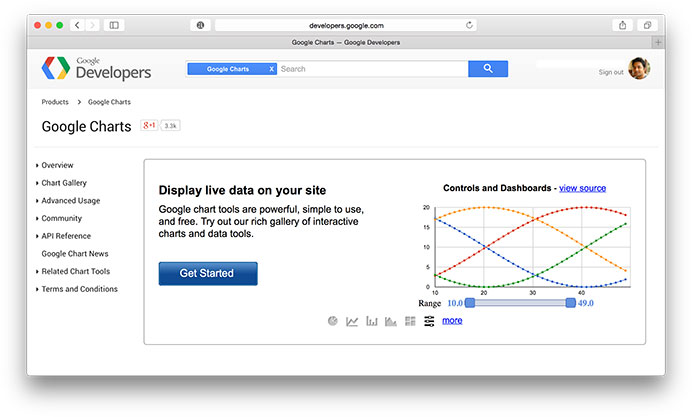
Google Charts is my go-to JavaScript library for creating charts easily. It provides many pre-built charts like area charts, bar charts, calendar charts, pie Charts, geo charts, and more.
Google charts also comes with various customization options that help in changing the look of the graph. Charts are rendered using HTML5/SVG to provide cross-browser compatibility and cross platform portability to iPhones, iPads, and Android. It also includes VML for supporting older IE versions.
Here’s a great list of examples built using Google charts.
ChartJS
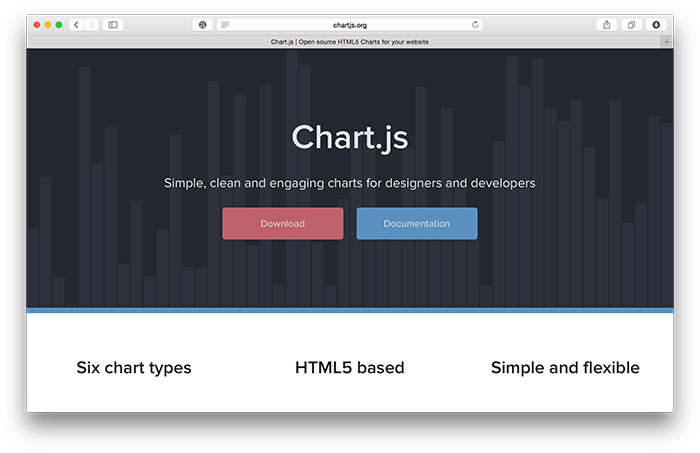
ChartJS provides beautiful flat designs for charts. It uses HTML5 canvas element for rendering. Support for older browsers like IE7/8 is added through polyfill.
ChartJS charts are responsive by default. They work well in mobiles and tablets. With 6 different types of core charts out of the box (core, bar, doughnut, radar, line, and polar area), ChartJS is definitely one of the most impressive open source charting libraries in recent times.
Chartist.js
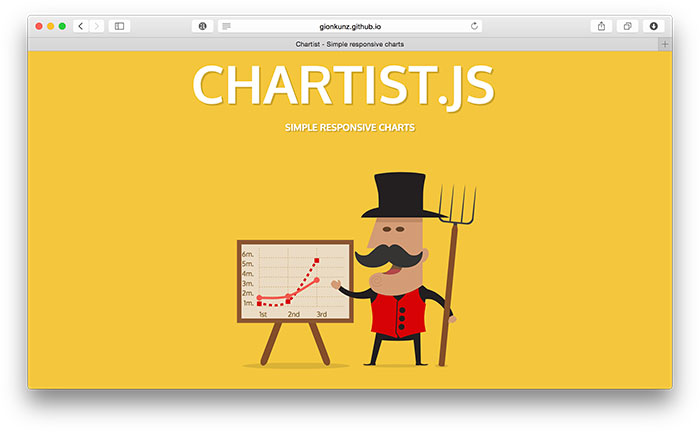
Chartist.js provides beautiful responsive charts. Just like ChartJS, Chartist.js is also the product of the community that was frustrated by using highly priced JavaScript charting libraries. It uses SVG to render the charts. It can be controlled and customised through CSS3 media queries and Sass. Also, note that Chartist.js provides cool animations that will work only in modern browsers.
n3-charts
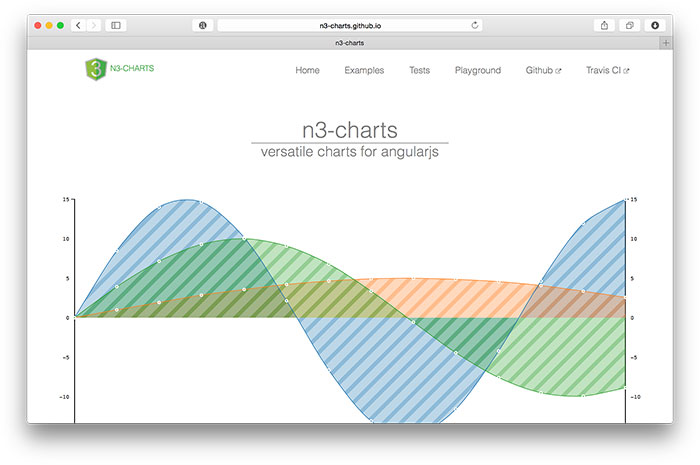
If you are an AngularJS developer, you will definitely find n3-charts extremely useful and interesting. n3-charts is built on top of D3.js and AngularJS. It provides various standard charts in the form of customisable AngularJS directives.
Checkout list of charts built using ns-charts.
Ember Charts
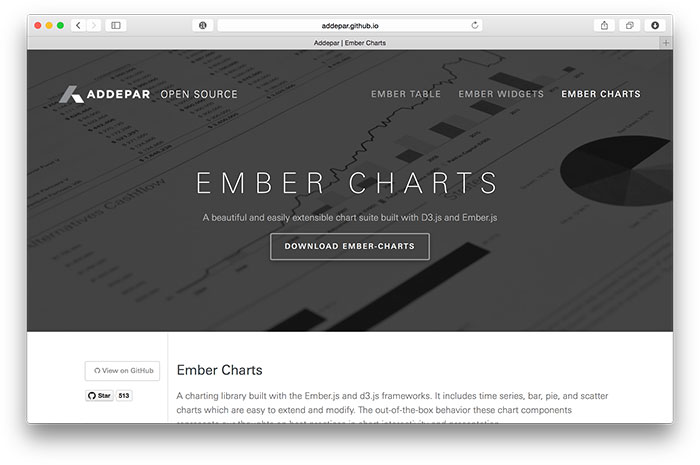
Ember Charts is another great open source repository built with D3.js and Ember.js. It provides time series, bar, pie, and scatter charts that are easily customisable. It uses SVG to render charts.
Smoothie Charts

If you are dealing with stream realtime data, Smoothie Charts may be helpful. It uses HTML5 canvas element to render the chart. It is a pure JavaScript library that provides options like delay and splash colors to the realtime graphs.
Chartkick
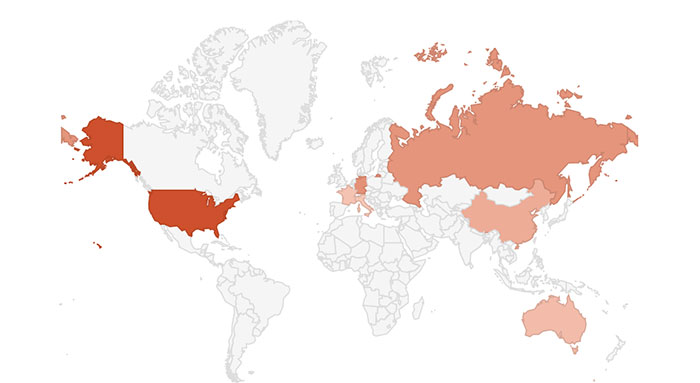
Chartkick is a JavaScript charting library built for Ruby applications. It provides all the major chart types like pie, column, bar, area, geo, timeline, and multiple series. The charts render via SVG.
ZingChart
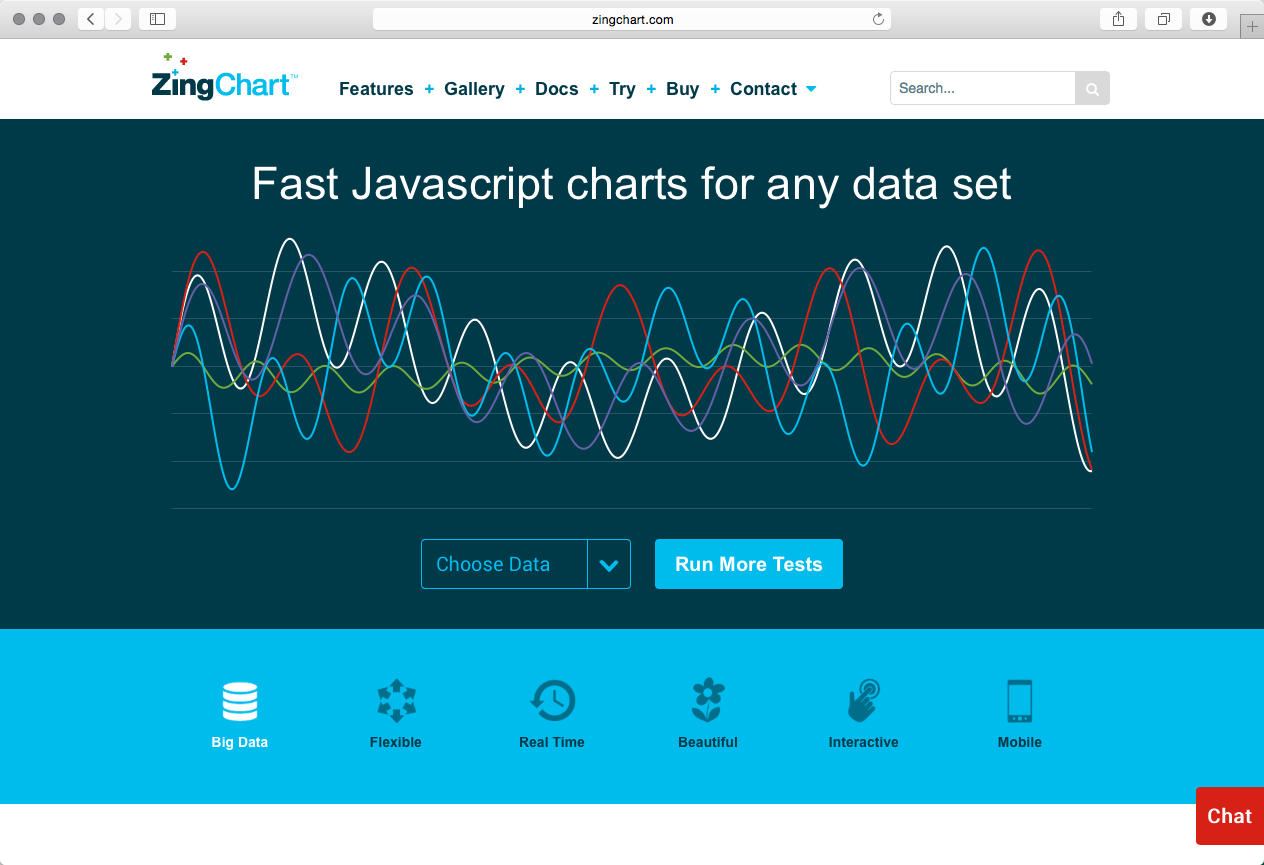
ZingChart offers a flexible, interactive, fast, scalable and modern product for creating charts quickly. Their product is used by companies like Apple, Microsoft, Adobe, Boeing and Walmart, and uses Ajax, JSON, HTML5 to deliver great-looking charts quickly.
Free to try, ZingChart licenses can also be bought at a variety of price-points to suit your business size. Check ZingChart out here.
Highcharts JS
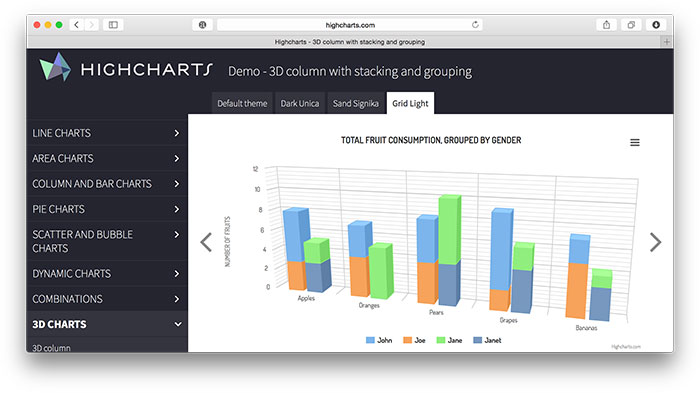
Highcharts JS is another very popular library for building graphs. It comes loaded with many different types of cool animations that are sufficient to attract many eyeballs to your website. Just like other libraries, Highcharts comes with many pre-built graphs like spline, area, areaspline, column, bar, pie, scatter, etc.
One of the biggest advantages of using Highcharts JS is the compatibility with older browsers like Internet Explorer 6. Standard browsers use SVG for the graphics rendering. In legacy Internet Explorer, graphics are drawn using VML.
While Highchats JS is free for personal use, you need to purchase a license for commercial usage.
Fusioncharts
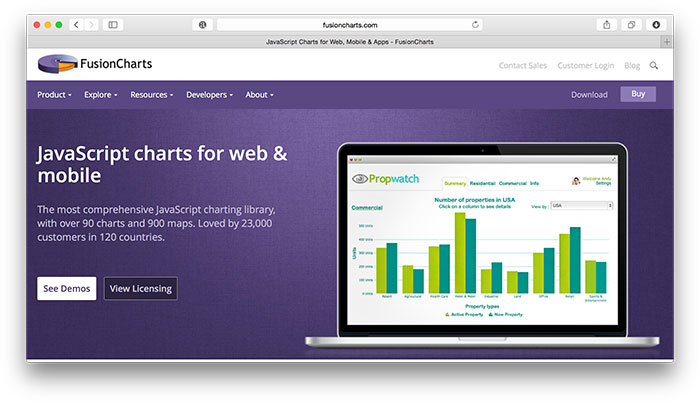
Fusioncharts is one of the oldest JavaScript charting libraries that was released in 2002. Charts are rendered using HTML5/SVG and VML for better portability and compatibility.
Unlike many libraries, Fusioncharts provides data parsing through both JSON and XML. You can also export these charts in three different formats: PNG, JPG and PDF.
Fusioncharts is highly compatible with older browsers like Internet Explorer 6. It has become one of the favorite charting libraries for many businesses just for this alone.
You can use the watermarked version of Fusioncharts for free in both personal and commercial projects. However, you need to purchase a license to remove the watermark.
Flot
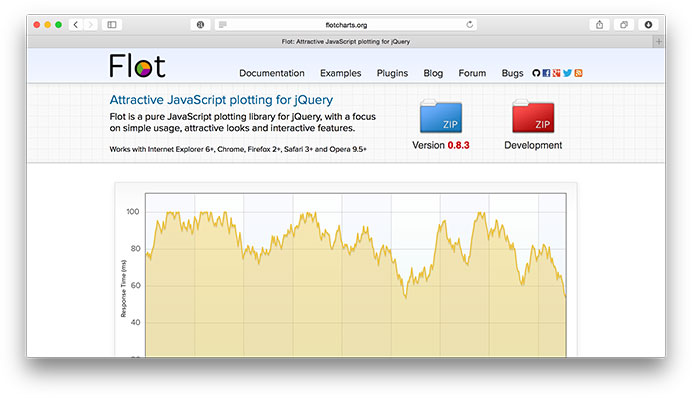
Flot is a JavaScript charting library for jQuery. It is also one of the oldest and popular charting libraries.
Flot supports lines, points, filled areas, bars and any combinations of these. It’s also compatible with older browsers like IE6 and Firefox 2.
Flot is completely free to use and commercial support is provided on special request to the creator. Here’s alist of example graphs created using Flot.
amCharts
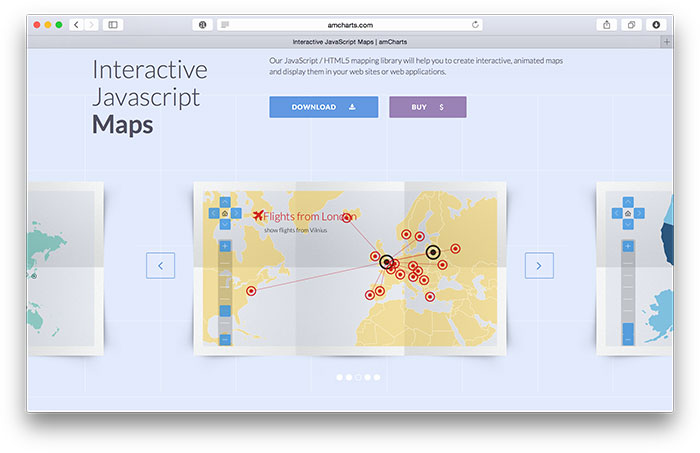
amCharts is undoubtedly one of the most beautiful charting libraries out there. It perfectly segregates itself into 3 independent charts — JavaScript Charts, Maps Charts (amMaps), and Stock charts.
amMaps is my favorite out the above three. It provides features like loading icons or photos on top of your map, heatmaps, drawing lines, and adding text on maps, zooming and others.
amCharts uses SVG to render charts that work in modern browsers only. These charts may not work properly below Internet Explorer 9.
Checkout this fantastic collection of cool demos created using amCharts.
The free version of amChart will leave a backlink to its website on the top of every chart. The commercial licenses are bit more expensive than most of the paid libraries in the market.
EJS Chart
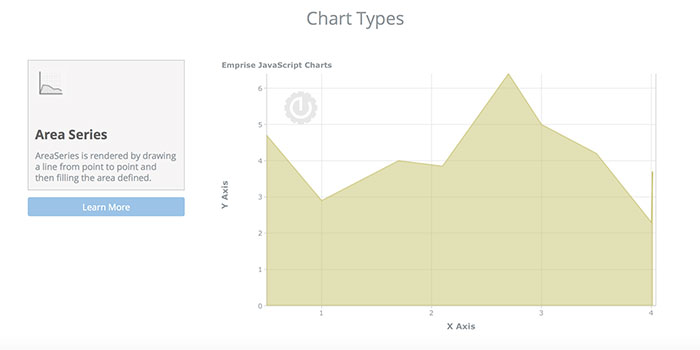
EJS Chart claim themselves to be enterprise ready charting library. The charts look clean and readable than most of the older charting libraries. It is also compatible with IE6+ and other older browsers. Check out this list of examples.
EJS Chart comes in free and paid versions. The free version limits you to use maximum of 1 chart per page and 2 series per chart. Have a look at the pricing details here.
uvCharts
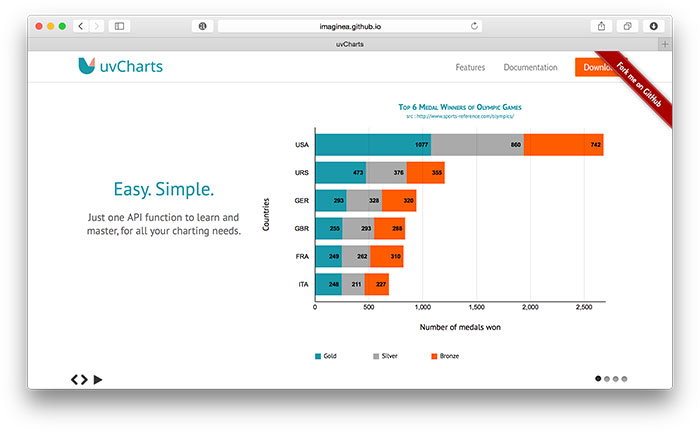
uvCharts is an open source JavaScript charting library that claims to have 100+ customization options. It has 12 different standard chart types out of the box.
uvCharts is built using D3.js library. It promises to eliminate all the difficult coding parts from D3.js and provide easy implementations of standard chart types. uvCharts are rendered using SVG, HTML and CSS.
Conclusion
It now depends on you to select the best charting library for your future projects. Developers who like to have all the controls over their charts will definitely opt for D3.js. Almost all the above libraries have got a good support via Stackoverflow forums.
If you are looking for tools to generate ready made charts, head over to 5 Tools for Creating Amazing Online Charts article. You can also read Creating Simple Line and Bar Charts Using D3.js article to get started with D3.js. We also have a dedicated series on using Google Charts with AngularJS.
